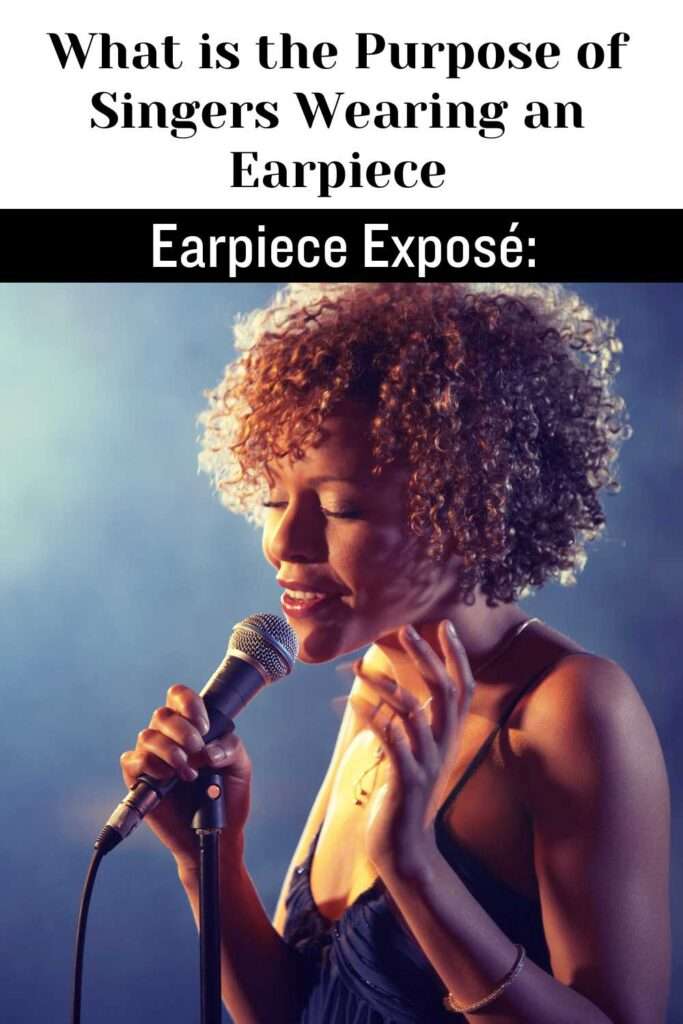Live performances and concerts of music are almost always visually appealing, but have you ever thought about what happens behind the scenes at events like these? It’s not uncommon to see singers wearing earpieces, but this detail is frequently disregarded.
What exactly are these minuscule pieces of equipment that are so important to the success of any live performance? This blog will delve into the world of live performances and investigate the reasons why singers wear earpieces, as well as the functionality of earpieces and the variety of earpieces available.
This blog is sure to provide you with some enlightening information, regardless of whether you are a music enthusiast or simply interested in the technical aspects of live performances. As a result, let’s get right down to business and investigate the reason why singers wear earpieces.
In this topic we will cover:-
- The Purpose of Earpieces for Singers
- How Earpieces Work
- Types of Earpieces for Singers
- Challenges of Wearing Earpieces for Singers
Why do singer Wear Earpiece
1. The Purpose of Earpieces for Singers
Earpieces provide singers with the benefit of protecting their hearing while also enhancing their ability to hear both their own voice and the music they are performing with greater clarity and accuracy.
The quality of the sound that a singer hears during a live performance can be affected by a number of factors, including the acoustics of the venue, the distance that separates the singer from the monitors, and the background noise that is generated by the audience.
If a singer does not have an earpiece, they might not be able to hear themselves or their bandmates clearly, which could lead to off-key singing and performances that are not up to par.
These issues can be remedied with the help of earpieces that are designed specifically for singers. These earpieces deliver a direct and individualized audio feed that is adapted to the preferences of the singer.
This feed might include their own voice, as well as music or other sounds, like stage prompts or band timing. A singer can exert a greater amount of control over their performance by donning an earpiece and making adjustments to their pitch, timing, and overall delivery based on what they are hearing in the audience.
Earpieces are worn by singers not only to improve the quality of the sound they produce but also to protect their hearing. Earpieces can help reduce the amount of noise a singer is exposed to while still allowing them to clearly hear their performance.
Over time, the high volume levels of live music can cause irreversible hearing damage, so earpieces can help reduce the amount of noise a singer is exposed to.
Earpieces for singers are designed to give the wearer a transparent and individualized audio feed, with the end goal of enabling them to perform at their highest level while also preventing damage to their hearing.
2. How Earpieces Work
Tiny devices that fit inside the ear and are able to receive an audio feed and then transmit it directly to the singer’s ear.
They are often custom-molded to fit the ear canal of the individual singer, and they are designed to be lightweight and comfortable for the singer wearing them.
A small speaker located in the middle of the earpiece is responsible for transforming the electrical signals coming from the audio feed into sound waves that are then delivered to the singer’s ear. The earpiece actually contains a small battery that provides power to the speaker.
A wireless receiver, which is typically situated on stage or in close proximity to the soundboard, is connected to the earpiece. This receiver sends the audio signal that is being generated by the sound engineer or mixing board to the earpiece in a wireless fashion.
Earpieces are typically designed to have a high degree of configurability, which gives singers the ability to adjust the volume, balance, and frequency response to better suit their specific requirements.
In challenging or noisy environments, certain earpieces may also feature noise-cancellation technology or ambient sound amplification to improve the singer’s hearing in those conditions.
Earpieces for singers, in general, are devices that transform electrical signals into sound waves and then transmit those sound waves directly into the ear canal of the singer.
Earpieces allow singers to hear their performance more clearly while protecting their hearing from the potentially damaging effects of loud music. Earpieces do this by providing a direct and customized audio feed to the singer.
3. Types of Earpieces for Singers
Singers have access to a wide variety of earpieces, each of which comes with its own set of benefits as well as drawbacks. The following are some of the most common varieties of earpieces used by singers:
Universal Fit Earpieces are earpieces that are designed to fit the majority of people and come in a variety of sizes and shapes so that they can be worn by as many people as possible.
Earplugs, which typically consist of foam or silicone, are designed to block outside noise by creating a tight seal inside the ear canal. On the other hand, the fit may not be as comfortable or secure as that of earpieces that are made specifically for the wearer.
Earpieces that Have Been Custom Molded – These earpieces are made from a mold of the singer’s ear canal and offer a safe and comfortable fit that is tailored to the singer’s specific anatomy.
In general, they are more expensive than universal earpieces, but they provide better sound quality and isolation and are therefore worth the additional cost.
Dual Driver Earpieces are earpieces that contain not one but two separate speakers, each of which is responsible for reproducing a different frequency range.
This can improve the sound quality as well as the clarity, which is especially important for singers because they need to be able to clearly hear both their own voice and the music.
In-Ear Monitors An in-ear monitor is a type of earpiece that consists of a microphone and a speaker. The microphone is intended to pick up the singer’s voice, and the speaker is intended to supply a direct audio feed.
They offer a high level of customization and control over the audio mix, and they are frequently paired with a wireless belt pack or transmitter to provide this level of functionality.
Noise-Canceling Earpieces These earpieces use advanced noise-canceling technology to block out external noise, allowing the singer to hear their performance more clearly and improving their overall experience.
On the other hand, they might be more expensive than other earpieces, and not all singers might be able to make use of them.
In general, the requirements of a singer, their personal preferences, and their financial constraints will determine which earpiece will serve them the best.
Singers can select the type of earpiece that will provide them with the highest level of sound quality, along with the most comfort, and the most protection for their performance by working with an experienced audio engineer or sound professional.
4. Challenges of Wearing Earpieces for Singers
Earpieces present singers with a number of challenges, despite the fact that they can be extremely helpful in certain circumstances. The following are some of the most frequent issues that arise for singers in relation to their earpieces:
Earpieces can be a source of discomfort for some singers, especially if they are not properly fitted or adjusted to the singer’s ears. This may result in ear pain or irritation as well as a distraction for the audience during the performance.
Earpieces have the potential to provide excellent noise isolation; however, this also has the potential to be a drawback. It is not uncommon for singers to experience a sense of disconnection from their surroundings and to have trouble hearing the cues being communicated by other performers and the audience.
Technical Difficulties Because earpieces are complex devices, they can experience a variety of technical difficulties, including interference, battery failure, and connectivity problems. These problems can be extremely frustrating for the singer, which can have an impact on the quality of their performance.
If a singer is used to hearing their own voice and the music they are performing through speakers or monitors, it can be challenging for them to adjust to the direct and personalized audio feed that is provided by an earpiece.
Because of this, it may be difficult for them to trust the sound that they are hearing, which in turn may hinder their confidence in their performance.
It’s possible for singers to develop an unhealthy dependence on their earphones, to the point where it becomes difficult for them to perform without them.
This could become a problem if the earpiece fails to function properly or if it is lost or stolen during the performance.
Earpieces present singers with a number of opportunities for improvement, but they are not devoid of potential drawbacks.
It is possible for vocalists to overcome these challenges and perform at their highest level if they collaborate with seasoned sound professionals and take the time to adjust to the earpiece.
Conclusion
In conclusion, earpieces can be extremely helpful tools for singers because they enable them to hear their performance more clearly while also shielding their hearing from any potential damage that could be caused by the performance.
The use of earpieces, on the other hand, is associated with a number of drawbacks, such as discomfort, isolation, difficulties relating to technology, and dependency.
It is possible for singers to overcome these challenges and reap the benefits of this technology by selecting the appropriate type of earpiece, collaborating with sound professionals who have experience, and taking the necessary amount of time to adjust to the device.
In conclusion, the most important thing for singers to keep in mind when using earpieces is to strike a balance between the benefits and challenges that they present, and to make use of earpieces as just one tool among many others in the singer’s toolkit in order to deliver an outstanding performance.
Frequently asked questions
Why do singers wear earpieces?
Earpieces are worn by singers so that they can monitor their own performance and protect their hearing. Through the use of earpieces, they are able to hear their own voice and the music more clearly while simultaneously blocking out noise that may be distracting or hazardous.
What is the difference between custom-molded and universal fit earpieces?
By creating a mold of the singer’s ear canal, custom-molded earpieces offer a secure and comfortable fit that is tailored to their exact anatomy.
Universal fit earpieces are available in a variety of sizes and shapes and are designed to fit the majority of people, but they may not fit as comfortably or securely as custom-molded earpieces.
Can earpieces cause hearing damage?
Earpieces have the ability to shield the singer’s hearing from harmful external noise; however, if the volume is turned up too high, they also have the potential to cause permanent damage to the singer’s hearing.
In order to ensure that the volume of their earpiece is both safe and comfortable, it is recommended that singers seek the advice of experienced sound engineers.
Do all singers need earpieces?
Earpieces are not required for everyone who sings, but they can be helpful for anyone who performs in an environment that is distractingly loud or has difficult acoustics. It may be beneficial for singers to wear earpieces to protect their hearing when they are performing in environments where they are subjected to loud noises for extended periods of time, such as in a concert setting.

